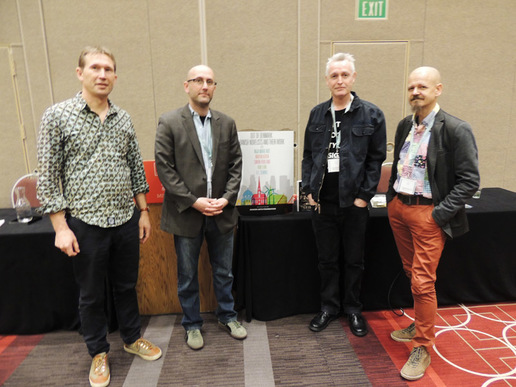 "Out of Denmark" l-r: Fruelund, Semmel, Aiken, Leine "Out of Denmark" l-r: Fruelund, Semmel, Aiken, Leine With around 530 panels at the AWP writers conference, recently concluded last weekend in Minneapolis, it’s not difficult to find sessions that mirror one's interests. For instance, I’m writing a novel based in the Iraq War. Not only did I find one that explored war, I found seven and made it to four. However, was I willing to explore areas that didn’t presently touch my life? Perhaps the most esoteric panel I attended was “Out of Denmark: Danish Novelists and Their Work.” Beyond Isak Dinesen’s Out of Africa and Peter Hoeg’s Smilla’s Sense of Snow, I didn’t know much about Danish literature other than an awareness that Danish detective fiction had a good following. In fact, last year I’d picked up a copy of Copenhagen Noir edited by Bo Tao Michaelis, but hadn’t read it yet. Knowing I’d be travelling to Denmark this summer, I sought out this panel and was rewarded. The panel featured two Danish novelists, Simon Fruelund and Kim Leine, and two translators, Martin Aitken and Kyle Semmel. As moderator, Semmel explained how Denmark is a small country, and its writers are a small community, even if some of them work in obscurity until they make it internationally. When Aitken translated Dorthe Nors’ Karate Chop, she wasn’t known—and then the story collection brought her recognition first internationally and then back home. Even though there were only two writers on the panel, I came away with a sense of the breadth of contemporary Danish fiction. Leine, for instance, won the Nordic Council Literature Prize for The Prophets of Eternal Fjord, an epic tale about a newly ordained Danish priest, Morten Falck, who travels to Greenland in 1787 to convert the Inuit to Lutheranism. There’s a collision between the Greenlandic and the Danish cultures. It will be published in translation in the U.S. in July. To get a sense of the sound and rhythm of his work, Leine read short passages in Danish, then his translator, Martin Aitken, read the same passage in English. Aiken said he translates with music in mind. He tries to capture the poetry of the book. In Leine’s voice, the sense of older Danish had to be carried over in English. “The main thing was the feel of the piece,” Aiken said. While I had my doubts about a story set in 1787 Greenland, they quickly vanished when Aitken read, offering a life-and-death situation set on a high cliff above the water. It reminded me how I fell into James Clavell’s Shogun, which was 17th-century Japan. Fruelund read in English from his newest book, Civil Twilight. It’s probably at the other end of the spectrum from Leine’s novel. Rather than traditional storytelling on an epic scale, this novella offers vignettes of people living on a single street near Copenhagen in the 21st century, and the snapshots of these people build on each other to reveal, as translator Semmel says, “that sections interlock, like pieces in a jigsaw puzzle.” As Semmel states in the foreword to the book, “You will not find a single word to clog the gears. He takes great care with his language, crafting it with precision, and his creations are the literary equivalent of Danish Design: smooth, clean, “minimalist” constructs that are built to last.” Fruelund said Carver and Hemingway had influenced him, and that to be a Danish writer, he had to consider “provincial vs. international. The Danish writer has to have this in mind.” In all, I left even more curious about Danish writing and will read more. This idea of pushing your sense of curiosity, by the way, is mirrored by film producer Brian Grazer, whose new book A Curious Mind: The Secret to a Bigger Life, explores how to keep open to new things. He says part of the challenge is you’re in a situation where people are superior to you in a certain area, and you have to be comfortable with that. In college, students accept it naturally, but older adults often don’t like to feel inferior. You have to get over that. Says Grazer, “Curiosity has never let me down—just the opposite. The only questions I regret are the ones not asked.” You can read the Los Angeles Times’ story on him by clicking here.
1 Comment
4/30/2015 08:26:00 am
1787 Greenland, sound fascinating. I love historical setting in different cultures!
Reply
Leave a Reply. |
AuthorBefore I wrote novels and plays, I was a journalist and reviewer (plays and books). I blogged on Red Room for five years before moving here. CategoriesArchives
July 2023
|
 RSS Feed
RSS Feed
